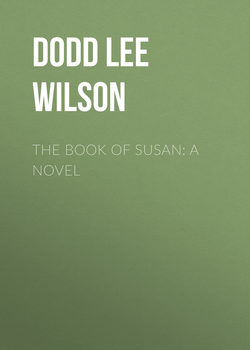Читать книгу The Book of Susan: A Novel - Dodd Lee Wilson - Страница 4
THE FIRST CHAPTER
IV
ОглавлениеI should probably, in my own flaccid way, have lost all track of Susan, if it had not been for certain ugly things that befell in Bob's four-room house one breathless evening – June twentieth of the year 1907. It is a date stamped into my consciousness like a notarial seal. For one thing it happened to be my birthday – my thirty-third, which I was not precisely celebrating, since it was also the anniversary of the day my wife had left me, two years before. Nor was I entirely pleased to have become, suddenly, thirty-three. I counted it the threshold of middle-age. Now that eleven years have passed, and with them my health and the world's futile pretense at peace, I am feeling younger.
This book is about Susan, but it will be simpler if you know something, too, concerning her scribe. Fortunately there is not much that it will be needful to tell.
I was – in those bad, grossly comfortable old days – that least happy of Nature's experiments, a man whose inherited income permitted him to be an idler, and whose tastes urged him to write precious little essays about precious little for the more precious reviews. My half-hearted attempt to practice law I had long abandoned. I lived in a commodious, inherited mansion on Hillhouse Avenue – an avenue which in all fairness must be called aristocratic, since it has no wrong end to it. It is right at both ends, so, naturally, though broad, it is not very long. My grandfather, toward the end of a profitably ill-spent life, built this mansion of sad-colored stone in a somewhat mixed Italian style; my father filled it with expensive and unsightly movables – the spoils of a grand European tour; and I, in my turn, had emptied it of these treasures and refilled it with my own carefully chosen collection of rare furniture, rare Oriental carpets, rare first editions, and costly objets d'art. This collection I then anxiously believed, and do still in part believe, to be beautiful – though I am no longer haunted by an earlier fear lest the next generation should repudiate my taste and reverse my opinion. Let the auction rooms of 1960 decide. Neither in flesh nor in spirit shall I attend them.
The tragi-comedy of my luckless marriage I shall not stop here to explain, but its rather mysterious ending had at first largely cut me off from my old family friends and my socially correct acquaintances. When Gertrude left me, their sympathies, or their sense of security, went with her. I can hardly blame them. There had been no glaring scandal, but the fault was inferentially mine. To speak quite brutally, I did not altogether regret their loss. Too many of them had bored me for too many years. I was glad to rely more on the companionship of certain writers and painters which my scribbling had quietly won for me, here and in France. I traveled about a good deal. When at home, I kept my guest rooms filled – often, in the horrid phrase, with "visitors of distinction."
In this way I became a social problem, locally, of some magnitude. Visitors of distinction – even when of eccentric distinction – cannot easily be ignored in a university town. Thus it made it a little awkward, perhaps, that I should so often prove to be their host; a little – less, on the whole, than one would suppose. Within two years – just following Ballou's brief stay with me, on his way to introduce that now forgotten nine-days wonder, Polymorphous Prose, among initiates of the Plymouth Rock Poetry Guild, at Boston – my slight remaining ineligibility was tacitly and finally ignored. The old family friends began to hint that Gertrude, though a splendid woman, had always been a little austere. Possibly there were faults on both sides. One never knew.
And it was just at this hour of social reëstablishment that my birthday swung round again, for the thirty-third time, and brought with it a change in my outer life which was to lead on to even greater changes in all my modes of thinking and feeling. Odd, that a drunken quarrel in a four-room house toward the wrong end of Birch Street could so affect the destiny of a luxurious dilettante, living at the very center of bonded respectability, in a mansion of sad-colored stone, on a short broad avenue which is right at both ends!
